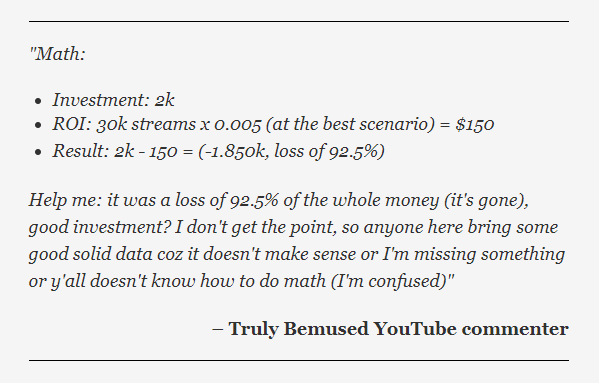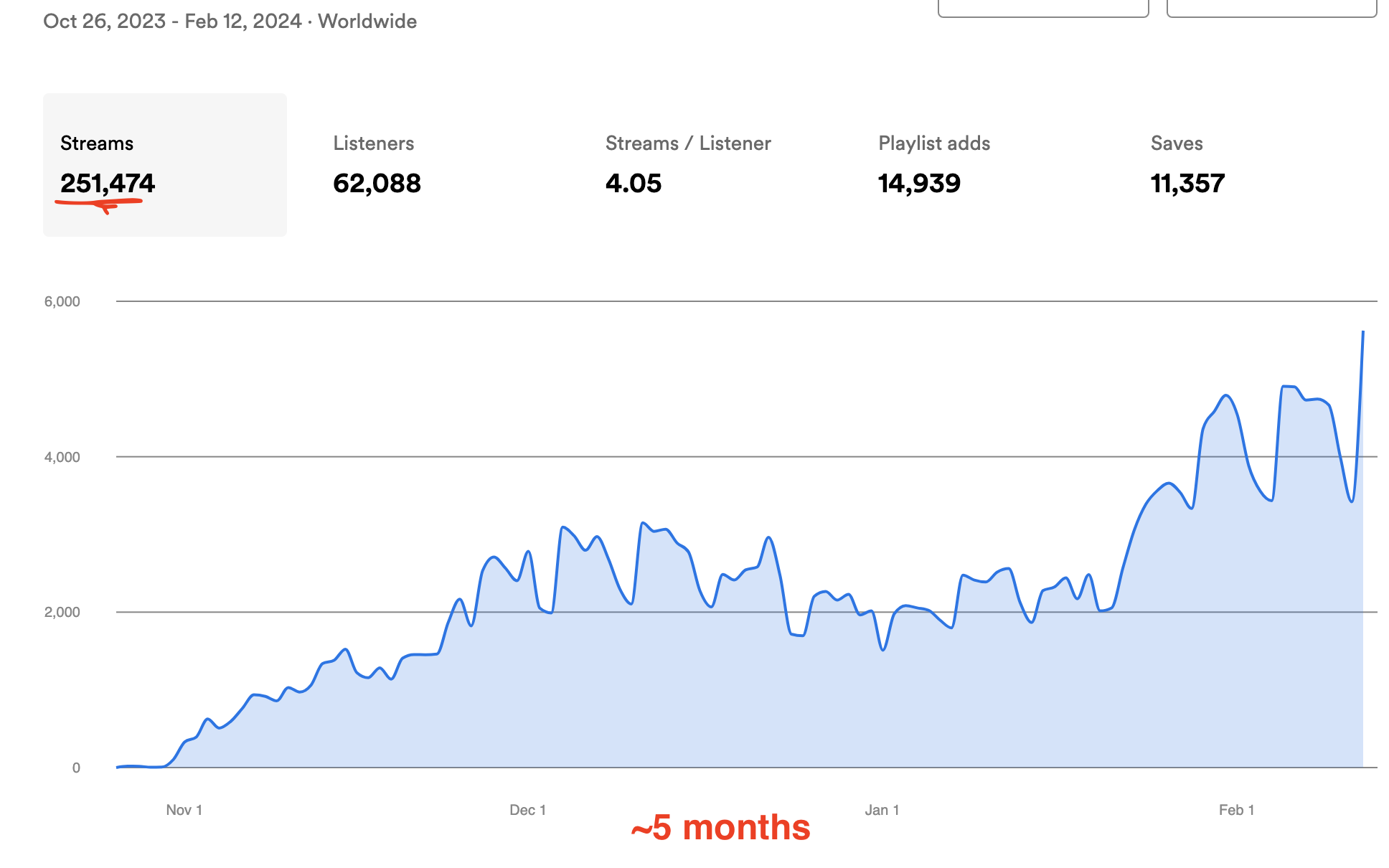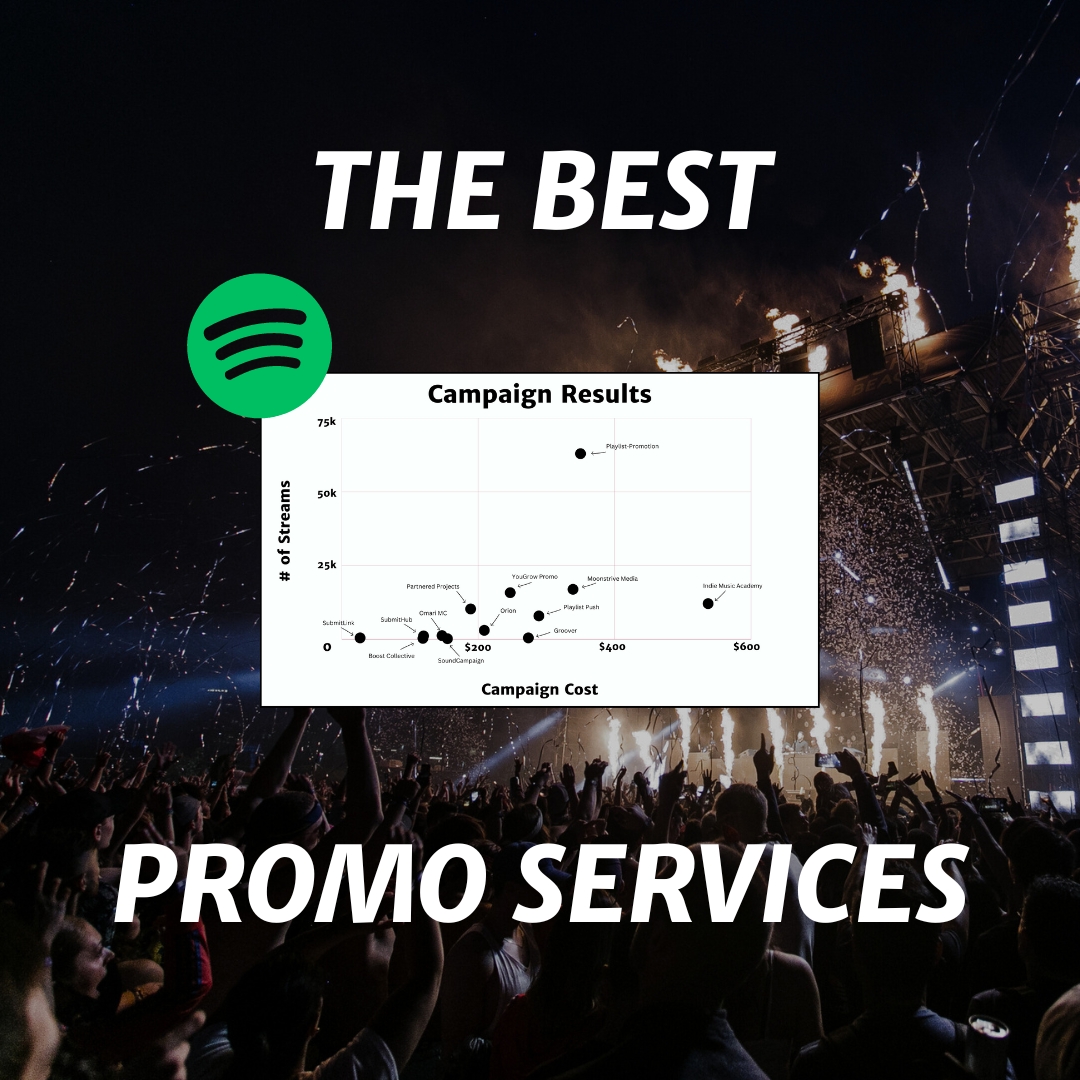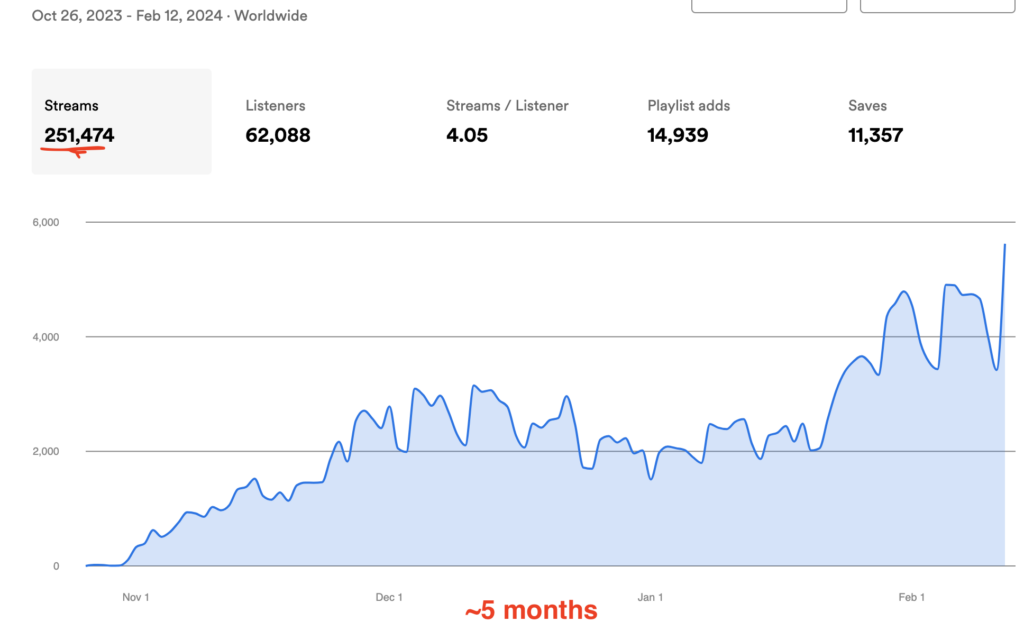My YouTube comment section is quickly becoming a gold mine for new posts.
Honestly, most of the comments I get are really nice; even the somewhat-challenging comments are usually structured politely. So far, my videos have never elicited quite the reaction that Tom provoked from Johan*. (Tom was asking for it, I think.)
But every so often, someone leaves a comment that, intended kindly or not, I just can’t get out of my head.
Here’s the most recent example…

For context, our confused friend was responding to this video, in which I walk through the results of a Facebook ad campaign designed to drive Spotify streams.
And despite what might be termed an over-fondness for parentheses (which I find relatable), our commenter gets all the numbers right: I spent a little over $2,000 on ads and ended up with a little more than 30,000 streams. I made less than $150 in streaming revenue.
So, was his implication right?
Like, did I do all of that just to waste around $1,850? Or, to put the question in more general terms…
Is Spotify promotion just a waste of money?
This question is sticking in my head, I think, because it directly impugns the legitimacy of almost everything I do. I mean, 90% of my revenue at Two Story is somehow related to Spotify promotion. I provide Spotify promotion as a service; I’m an affiliate with other companies that provide Spotify promotion as a service; I get most of my web traffic by writing and talking about Spotify promotion.
Obviously, I have a clear motivation to defend the worthiness of spending money on Spotify growth.
So you’ll be unsurprised to hear my answer:
Oh yeah Spotify promotion is definitely worth it.
Please stop questioning it. Just pay me or one of my partners to do Spotify promotion for you and all of your worries will be solved – more people will hear your music, your family will love you, and you’ll have good skin.
Kidding, obviously. You’ll need a good moisturizer, too.
My real response, developed after thinking about this YouTube comment for far too long, is that the question of whether Spotify promotion is “worth it” depends on how you define worthiness.
Here’s what I mean…
1) If worthiness = direct monetary ROI, then Spotify promotion is almost never worth it. That’s the sad truth. Unless a campaign goes bonkers, you will almost always pay more for streams than you’ll make in streaming revenue.
Because you’ve got to drive streams at less than $0.003 per stream to have a direct positive ROI… and that’s just really difficult to do.
2) If worthiness = long-term monetary ROI, then Spotify promotion is sometimes worth it.
Ideally, an audience on Spotify will allow you to recoup your spend over the long-term; a bigger audience helps you sell more merch, get more collab opportunities, land more sync placements, etc. If you’ve got a strategy and stay committed, you can definitely make this work.
But the honest (and still pretty sad) truth is that most people who spend money to get streams on Spotify never really recoup the cost. They don’t have a solid strategy in place to capitalize on the streams, or maybe they quit the project and stop making music before they get to see the return.
Basically, they spend on Spotify because they want to make money over the long-term, but they never quite realize their goal.
3) If worthiness = personal satisfaction, then good Spotify promotion is often worth it.
Take my own spend, for example: I was pretty happy with the streams I got for $2,000 – it felt really rewarding to have 30,000-ish people hear my music.
And because the promotion was targeted, those were generally engaged streams. I collected a decent number of Spotify followers and got a lot of nice comments from random people on Instagram. So, no, I don’t have plans to recoup my $2,000 monetarily, but I still consider the connections I made to be “worth it.”
I think many artists are in a similar boat. They want people to hear their music and connect with it; money, if it comes, is a nice side effect.
Maybe it would be simplest to put this all in economic terms:
Money is just a store of value, and value is subjective.
So the answer to any question of economic worth is always “it depends.” (Come on, you knew I’d end up there.)
I’ll end with two takeaways – one for you and one for me.
First, for you: Before you spend on any sort of promotion, it’s a good idea to determine what you’re hoping to achieve.
Do you want to be short-term ROI positive? Well, you probably shouldn’t pay for Spotify promotion.
Do you want to grow a profitable fanbase over time? Great, but you better have a real good plan for monetizing the numbers you draw.
Do you want to connect with an audience? Define what that actually means and then invest in tactics that align with your expectations. (Playlists probably aren’t it.)
Second, for me: I think artists are most likely to be disappointed with Spotify promotion when they go in looking for long-term monetary ROI, but don’t have the strategies in place to actually make it happen.
So, if I want to bridge the gap, I should probably write more about how to monetize fanbases.
One reason I haven’t written about this more often: Honestly, I’m not an expert at monetization strategies. I have never made a full-time living as a musician myself. I work with full-time musicians, but a) most of them wish they were making more, and b) I don’t directly contribute to the stuff that actually brings in their money (which is most often live shows and sync placements). I could solve this by getting more hands-on with monetization strategies or by interviewing experts – but to have valuable things to share, I’d need to put in more work.
As you may be able to tell from the ridiculous amount of time I’ve spent discussing a YouTube comment, I care (too much) about your feedback. Feel free to reach out and send me your suggestions.








